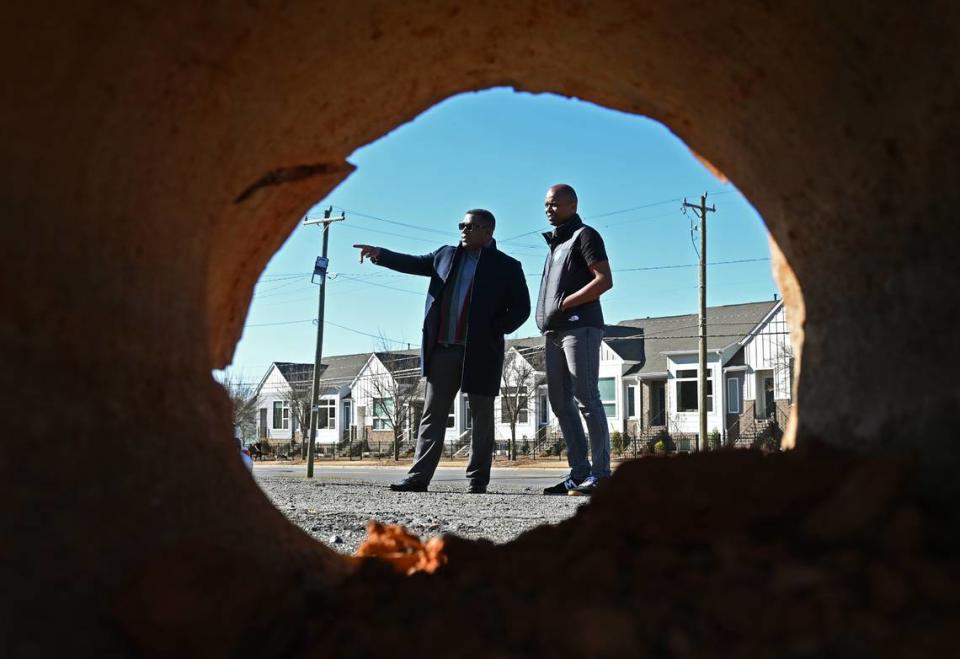Barriers still exist for Black developers in Charlotte. Meet the people changing that
Rodney Faulkner and William Haygood pace the vacant lot off Statesville Avenue — just outside uptown — and picture what’s to come.
Dirt piles in one corner will be replaced with up to 375 apartments and up to 50 town homes. Tall weeds threatening to outgrow the Charlotte skyline will be cut down in favor of an 8,000- square-foot grocery store.
It’s the type of scene that plays out regularly across a growing city like Charlotte: developers jockey for land to build the next retail, residential or office building. But the work of Faulkner and Haygood, old friends who met at West Charlotte High School in the 1990s, stands out for another reason.
They are among only a few Black real estate developers and brokers in Charlotte.
As founders of the commercial real estate firm Boundary Street Advisors, they are in an even smaller club — Black men who hold executive positions in the commercial real estate industry.
And they are in the vanguard of a small but growing group of Black developers helping to change the face of the industry in Charlotte, a trend that’s being mirrored nationally.
A number of factors create barriers for developers of color, including access to capital, six real estate experts told The Charlotte Observer. Wealth gaps between Black and white families also play a role as does the ability to secure a loan.
Commercial real estate has historically been a white industry, with one recent industry survey finding that of more than 170 firms in North America, 65% were white while 7% were Black.
Black and Hispanic developers make up less than 1% of the real estate development industry, according to a recent New York Times story. The data comes from a report released this month from Grove, a Washington, D.C. nonprofit social-impact consulting group. Of 383 developers generating more than $50 million in revenue annually, only one is Latino while none is Black, the same report found.
The number of people of color in commercial real estate has been improving the past three years after the police killing of George Floyd resulted in a number of companies examining hiring practices and other policies related to racial equity.
For the first time in recent memory, a handful of multi-billion dollar development projects nationwide are being led by Black development and construction firms, said Ken McIntyre, CEO of the Real Estate Executive Council. That includes a proposed 90-story tower in New York City.
“The momentum has never been better,” McIntyre said. The trade association promotes the interests of executives of color doing business in commercial real estate.
“That’s reflective of the maturation of talent of developers of color reaching the point where their ability to pursue these mega, multi-billion projects is viable,” he said.
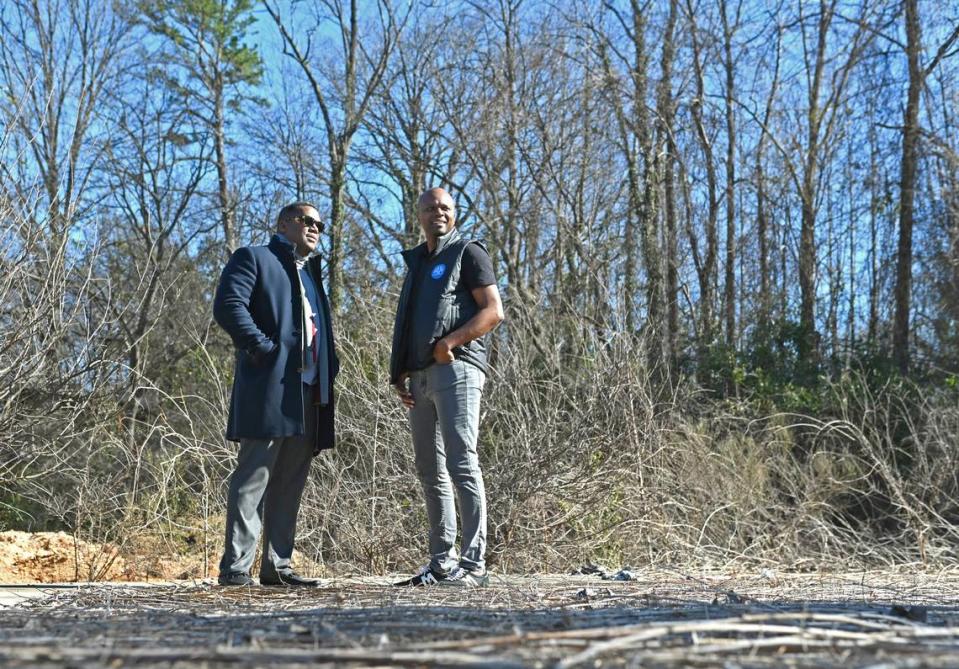
Access to capital as a barrier
It also helps to have friends like Hugh McColl.
The retired Bank of America CEO has helped James Scruggs, a Black Charlotte developer who graduated from UNC Charlotte in 2019 with a Master of Science in real estate development.
For the past several years, McColl has taken it upon himself to work with younger people of color to achieve economic well-being.
“What I’m trying to do is help with equality of opportunity,” McColl told The Observer. In 2015, McColl made a decision to devote his time to Charlotte’s Black community by investing in education buildings, affordable housing and job programs, Politico reported.
Scruggs is CEO and president of Kingdom Development Partners, a real estate development firm primarily focusing on residential projects.
Formerly a bonds trader for Bank of America, Scruggs began investing in real estate in 2002 when he bought 20 single-family homes in Charlotte. His first project came in 2013 when he developed an assisted-living facility.
In 2016, he launched Kingdom Development Partners, which focuses on building town homes, single-family homes and soon, apartments. He’s in the early phases of building a roughly $90 million project in University City that will consist of 60 to 80 build-for-rent town homes and 340 apartments.
His goal is to grow the company to build mixed-income communities for sale. That would help bridge the wealth gap through home ownership between white and African American families, Scruggs said. But to do that, he needs institutional capital.
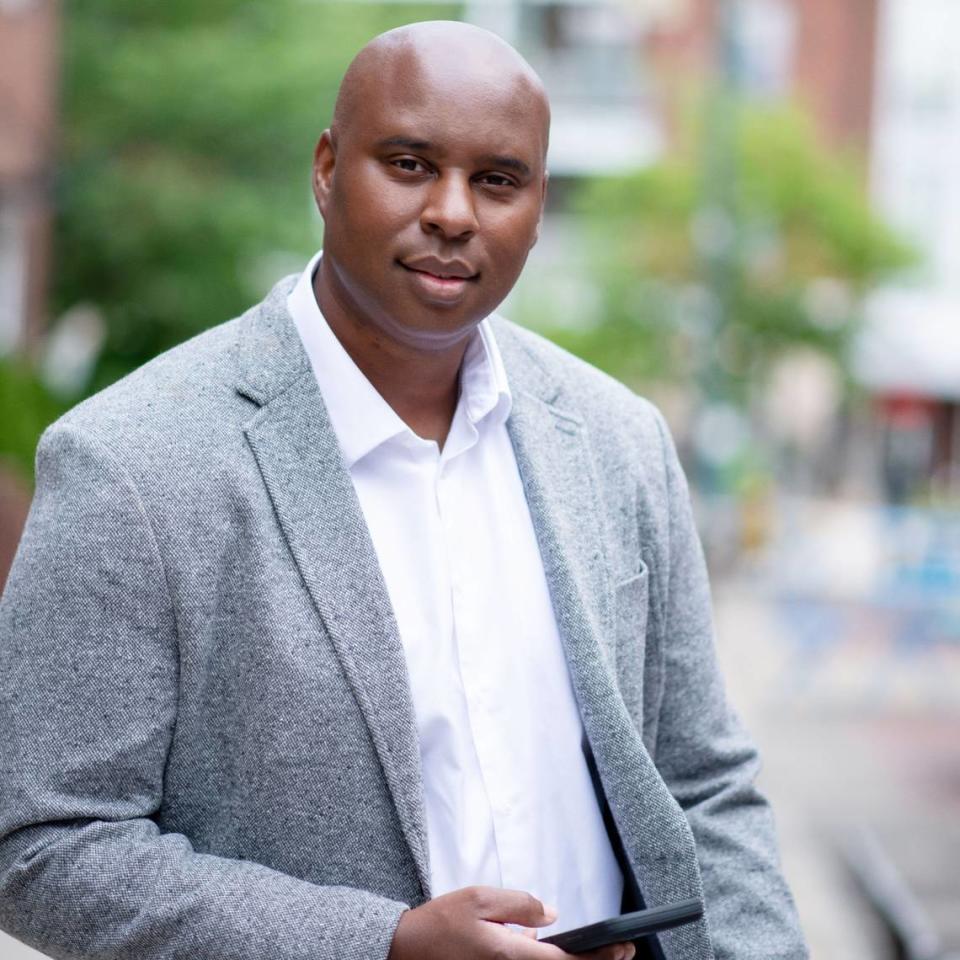
McColl joined Scruggs in meetings with banks and other developers and is helping introduce him to high net worth people.
Access to capital is the biggest barrier facing developers of color, said Colette English Dixon, executive director of the Marshall Bennett Institute of Real Estate at Roosevelt University in Illinois. Developers need to keep their business afloat while constructing buildings that aren’t generating revenue, Dixon said.
Black developers might not have the same pool of family and friends that their white counterparts can approach for an initial investment, she said. Studies have shown the net worth of the typical white family in America is significantly higher than Black households.
For developers of color, that means it’s more difficult to compete on any project of scale — like a high-rise apartment building — because they don’t have that capital. It also becomes harder to build a portfolio and grow their company.
Lenders are looking at developers with strong capital base before becoming involved in a deal.
“If those resources aren’t obviously there, it’s hard to get financing to get that bigger deal,” Dixon said. “It’s a significant limitation.”
Seeing value in west Charlotte
Rodney Faulkner’s answer to facing barriers in the industry is to get creative.
Before he started Boundary Street Advisors, Faulkner was a broker with a real estate firm in Charlotte. He also grew up on the west side of town, around Beatties Ford Road.
One restaurant at the corner of Beatties Ford Road and Lasalle Street was falling into disrepair — including big pot holes in the parking lot. He wanted to change that.
In 2011, Faulkner learned he had gone to high school with the property owner’s son. He worked with the owner to list the property for sale. It eventually was sold to Walter B. Davis, who runs a minority-owned construction firm in town.
Davis had Family Dollar on board, and eventually knocked the restaurant down to build the store.
It was the first ground-up development in this area in 18 years, Faulkner estimates. The deal was bigger than just a store opening. It showed the wider community that this area has value.
“I looked at that as an opportunity to plant my flag there,” Faulkner said, “and make a real impact.”
Since then, that intersection has continued to see new developments come in. That includes work by another Black developer, Chris Dennis, who redeveloped two properties across the street and brought in a number of small businesses.
The neighborhood’s value was always present, Faulkner said, even if developers and retailers were wary of building there in the past.
Faulkner felt there was more work like this to be done around Charlotte. He and Haygood reconnected and started Boundary Street Advisors in 2018.
The full-service firm handles property and construction management on top of development and brokerage. They work on projects across the region, including a 40,000-square-foot build-to-suit medical office building in Indian Land, S.C.
The firm is named after a street in the old Brooklyn neighborhood that Haygood’s great-grandmother grew up on. Brooklyn, a predominantly African American community with Black-owned businesses, was torn down in the 1960s and 1970s in the name of urban renewal.
By naming the firm after the street in Brooklyn, Haygood and Faulkner have something to attach themselves to while pursuing development projects in an industry they previously had no connection with.
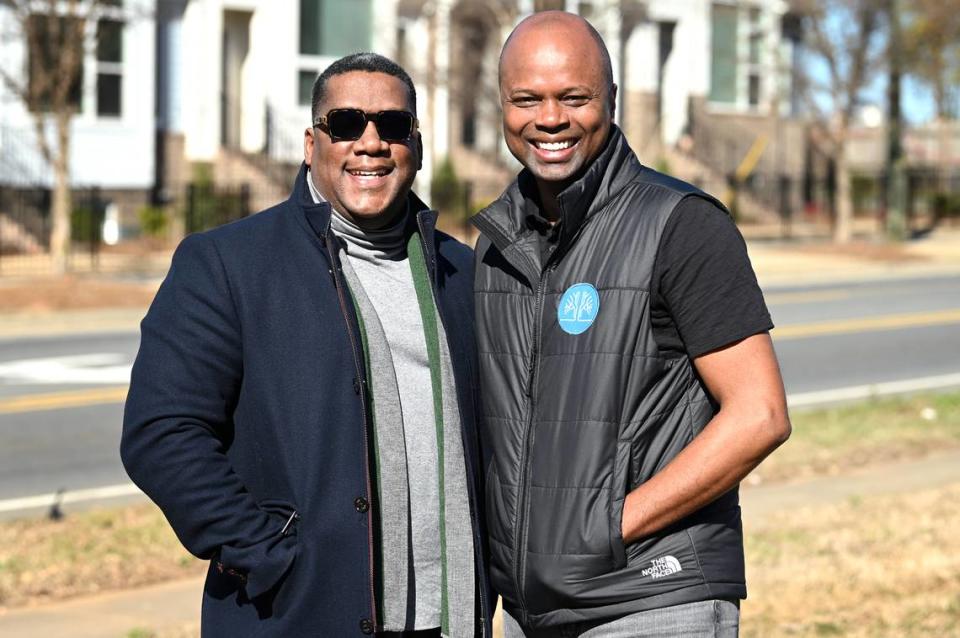
Minority-led firms supporting each other
Darrel Williams studied architecture at Southern University and A&M College in Baton Rouge, Louisiana.
In the mid 1990s, Williams, who is Black, co-founded the architecture firm Neighboring Concepts in Charlotte along with Michael O’Brien and Chris Ogunrinde. Williams retired from the firm late last year but still practices architecture.
The firm, Williams said, wouldn’t be where it is today without the help of a few key relationships.
One was with the city of Charlotte, which the firm worked several projects for over the years. Another was Mecklenburg County. The county gave the company work over the years, including helping to design the Eastway Regional Recreational Center.
The bulk of work it was initially getting — and relying on —came from government bodies that stress minority participation in the bidding process.
The private sector wasn’t giving Black architects like him work. “They hire people that look like them,” Williams said. Much like the commercial real estate industry, the majority of licensed architects in the United States are white.
After Floyd’s death, things started to change, Williams said. The firm started to get calls from national developers who were looking to work in Charlotte. Neighboring Concepts got some repeat clients out of those deals.
“All it took was for them to see our work,” he said.
While Neighboring Concepts generally had to rely on public work, Williams’ firm also got support from the Black community.
He’s teamed up with Black Charlotte developers like Bobby Drakeford. Neighboring Concepts also works with Laurel Street, which is led by Dionne Nelson.
Laurel Street, named after a street Nelson’s grandmother grew up on in South Carolina, is a multifamily residential development company. Laurel Street has a large portfolio of more than 5,000 units as the company specializes in mixed-income housing projects in Charlotte and across the Southeast.
Nelson first hired Neighboring Concepts while working on Renaissance, a 334-unit residential project off West Boulevard near Billy Graham Parkway.
“I do think that part of our responsibility is to support one another,” Nelson said.
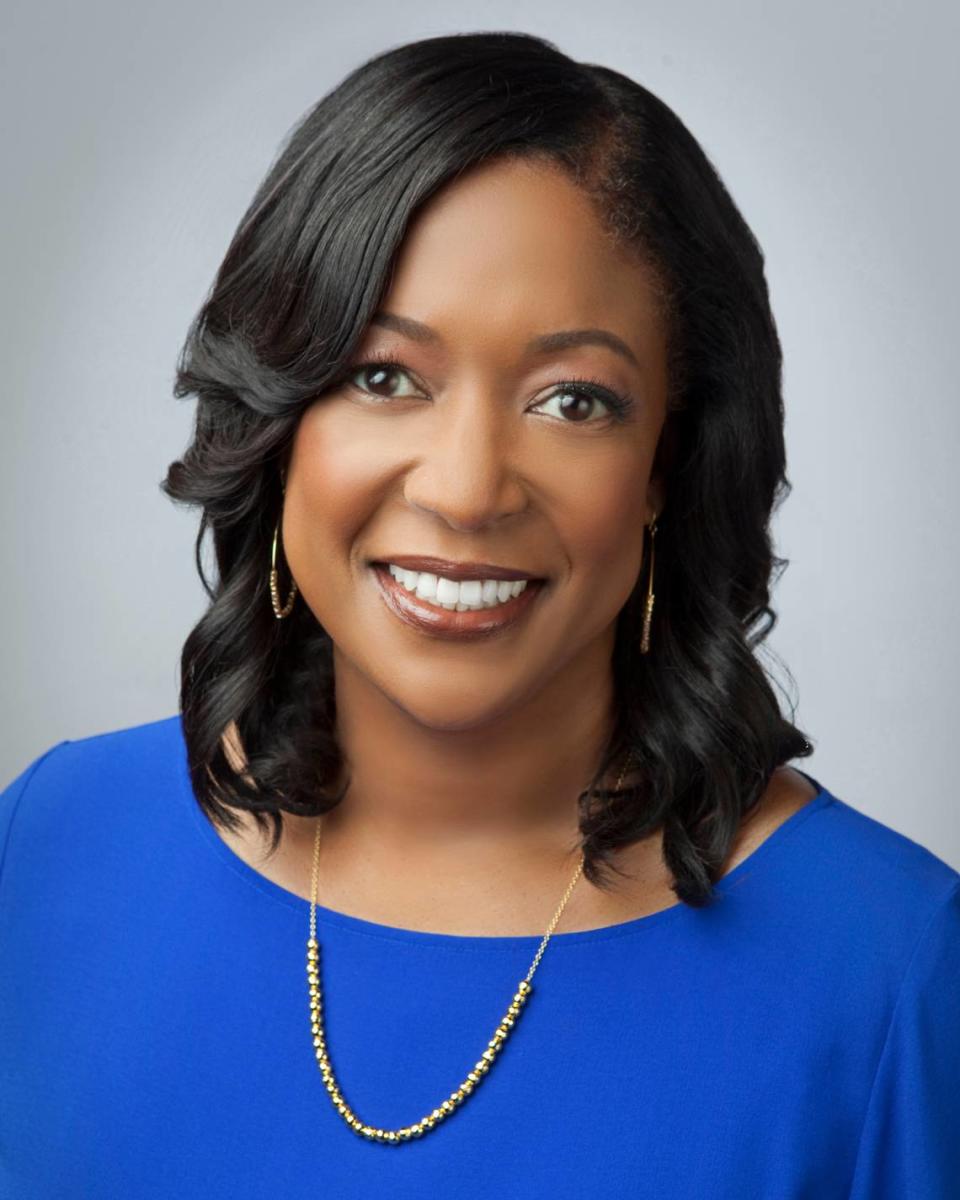
There are communities of color that would benefit from having developers of color who are more understanding of the needs of a community, Dixon of Roosevelt University said.
It ultimately means a growing city like Charlotte will be better off when the needs of its diverse population are understood by developers shaping neighborhoods.
Focus on recruiting and retention
Floyd’s killing also impacted businesses practices around diversity in commercial real estate.
The focus on commercial real estate is important because a more diverse developer and broker industry can better understand — and respond to — the needs of the communities they’re shaping, real estate experts agree.
A survey last year found that of 171 real estate companies in North America, 82% of executive positions were held by white people and about 2% by Black people, according to the 2022 Global Real Estate DEI survey.
The survey was by Ferguson Partners, a talent management firm based in Chicago. The Urban Land Institute, a Washington, D.C.-based nonprofit, also was part of the survey as were six other real estate trade associations.
There are signs the industry is becoming more representative of the country, including a slight uptick in the past year in the number of people of color in the surveyed real estate firms, the 2022 global DEI report found.
More real estate companies also appear to be working on hiring a diverse workforce. But key gaps remain, experts said.
A larger share of companies today, or 56%, have a formal diversity, equity and inclusion program compared to the year prior when it stood at 49%, according to the Ferguson survey.
One important effort is to expose high school and college-aged students to commercial real estate to ensure they know it’s a viable career path, said Dionna Johnson Sallis, DEI director at Ferguson Partners.
If the industry has historically been a homogeneous one, it will take time and exposure for younger people of color to break through, she said.
But companies need to focus on retention, too.
Women of color in senior positions in commercial real estate left those jobs at twice the rate they were hired, according to the 2022 Global Real Estate DEI survey.
One reason could be they discovered the work culture didn’t align with values promoted during the interview process, Sallis said. Another reason could be those women didn’t have a mentor who helped navigate the work culture.
For Haygood and Faulkner at Boundary Street, getting exposure on projects is key to growing their company.
A real estate investment group that owns the property off Statesville Avenue gave the pair more control of the grocery store and apartment project over time.
That meant they were there in front of Charlotte City Council during the rezoning process. They led conversations with city planning staff. They gave their input on why the project should be built a certain way.
“That itself is helping us to establish ourselves,” Haygood said. Development is the culmination of brokering land deals, financing construction and working with city governments.
With more experience, Haygood and Faulkner can learn how each part works together — and grow a portfolio.
